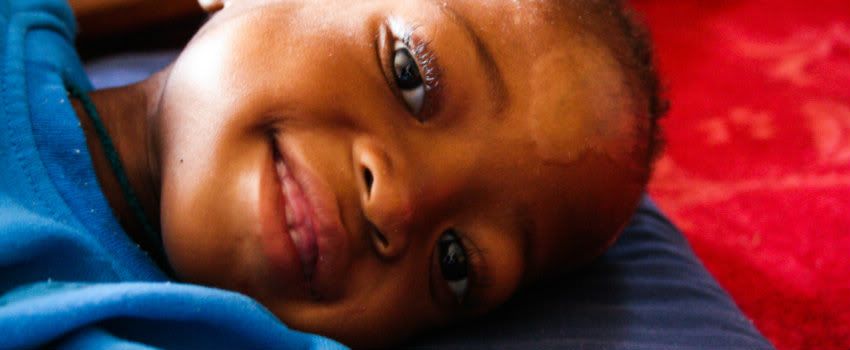Lately, I've been caught up -- namely in a million administrative tasks. They are the duties that help make this place run smoothly, and they come in floods.
Then, yesterday, I was caught off guard -- once by a moment of happiness, once by a moment of sadness.
In the midst of my administrative work, both moments were like sudden flashes of light in a dark room: shocking enough to make me close my eyes for a second in adjustment, and bright enough to give me a clear dose of reality apart from my office bubble.
The first occurred when I slipped into the playroom to take another look at the babies. We have a total of eight now.
We have Ntseliseng and Selloane, who I mentioned last week, as well as Nthati, who has been here the longest and who seems to be doing really well. We have Mamello, who is three months, Karabo, who is wild at one year, and the twins Bohlokoa and Bohloeki, who are staying strong and doing better.
We also recently took in Mpho, a tiny little boy who was born on June 6 at less than 4 pounds and referred immediately to TTL. He was born a twin, but his sibling didn't make it.
My moment of happiness came with Ntseliseng.
I've been trying to get her to use her legs more and more, pulling her onto them and holding her hands as I lead her forward. In the past, she has burst into tears or sort of welled up in resistance each time I attempted this exercise. Her legs are tiny, and it's tiring for her to use them.
But yesterday, the reverse happened. I pulled her onto her legs, and amazingly, she laughed. I walked her forward, and she giggled with each step. I verbally encouraged her more and more, and she looked back at me and then around the room, as if to say, "Hey, everybody, look at me!" She kept laughing with each smile from the bo'me.
For me, it signified a possible turning point in her development. If she associates making an effort to use her legs with accomplishment and encouragement, maybe she'll start making that effort more often.
After a few feet, I stopped backing away from her, and let her fall into my chest. She pulled herself up to a standing position, holding onto my shoulders. She was out of breathe a bit, but smiling. I smiled back.
It wasn't long after when my moment of sadness came.
I was sitting in TTL's front office when one of our outreach workers, Kokonyana, came in with a mother and baby. The mother pulled up the shirt of the infant, who was crying, and I could see what appeared to be a bulge in the baby's side disappear and then reappear on her other side. It seemed almost as if it were pulsating back and forth.
Kokonyana gave me the baby's bukana, and I saw the words "bilateral hernia" scrawled in black pen.
I'd never heard of such a thing, but guessed what it meant.
I also saw that the Mokhotlong hospital had referred the baby to the hospital in Maseru. Another one of our outreach workers told me the mother is mentally ill, a complicating factor in the entire situation. I looked at the nonchalant way the mother held the baby, and heard the wail of the baby, and cringed.
We supplied the mother with a fresh can of formula, a bottle brush and soap, and then took her back to the Mokhotlong Hospital to see what we could do to help facilitate her trip to Maseru. We were able to get her admitted to the C Ward, where she will receive assistance and transportation to Maseru. It's all we could do at this point, but it didn't diminish my concern.
Both moments, like I said, were like sudden flashes of light. I think I am still blinking from both...

